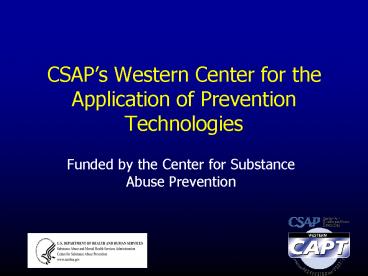CSAP - PowerPoint PPT Presentation
1 / 18
Title:
CSAP
Description:
CSAP s Western Center for the Application of Prevention Technologies Funded by the Center for Substance Abuse Prevention What is a CSAP s CAPT ? – PowerPoint PPT presentation
Number of Views:93
Avg rating:3.0/5.0
Title: CSAP
1
CSAPs Western Center for the Application of
Prevention Technologies
- Funded by the Center for Substance Abuse
Prevention
2
What is a CSAPs CAPT?
- The Centers for the Application of Prevention
Technologies (CAPT) are CSAP funded projects
since 1997. - Five regional centers - CSAPs Western CAPT now
serves the border region along with 17 states and
territories.
3
Goals of the CAPT
- CSAPs CAPTs assist in bridging the gap between
research and practice in the field of substance
abuse prevention. - Visit www.captus.org to visit CSAPs National
CAPT web site (products and links to each
regional web site)
4
(No Transcript)
5
CSAPs Western CAPT Products
- Web site on Building a Successful Prevention
Program - Best Practices and Promising Practices Booklet
- Tip of the CAPT
- Prevention Talk
- Talking to Your Kids about Alcohol
6
More Products
- Developing Healthy Communities
- College Courses for Substance Abuse Prevention
- Community Readiness
- How to Make Prevention More Powerful
- Smoke-Free Work Sites
- Research-Based Literature Reviews
7
CSAPs Western CAPTTrainings
- Substance Abuse Prevention Specialist Training
- Summer Institute for Addiction and Prevention
Studies - Service to Science Academies
- Substance Abuse Prevention Community of
Learners (On-line)
8
National CAPT Products TrainingsUnder
Development
- National CAPT Briefs
- Coalition Building
- Evaluation
- Fidelity and Adaptation
- Evidence-based Prevention
- Sustainability
9
For More Information on our Products and Trainings
- www.westcapt.org
- Download free copies of our products!
10
For On-line Course Information
- www.casat.org
11
To Subscribe to our Listserve, Visit
- www.westcapt.org
- Click on Products
- This is the best way to find out what were up to!
12
CSAPs Western CAPT Building a Successful
Prevention Program web site
- This web site provides tools and information on
program planning - www.westcapt.org
- Click on Planning and Best Practices
13
Seven Steps to Building A Successful Prevention
Program
1. Increase the readiness of the
community 2. Assess the levels of risk factors
and protective factors in the community 3. Transla
te data into priorities 4. Examine the resources
in the community that are reducing risk factors
and increasing protective factors
14
Seven Steps to Building A Successful Prevention
Program (continued)
5. Focus efforts 6 Use best practices and
guiding principles 7. Evaluate
15
SAMHSAs Strategic Prevention Framework
- Profile needs, resources, and readiness
- Mobilize and build capacity
- Develop a comprehensive strategic plan
- Implement evidence-based prevention programs and
develop infrastructure - Monitor, evaluate, sustain and improve
16
Strategic Prevention Framework ToolSAMHSAs
Prevention Platform
- http//preventionplatform.samhsa.gov/
17
Contact Information
- Denise Grothaus
- denise_at_unr.edu
- 775.465.9661
- I enjoy hearing from you!
18
Questions?































